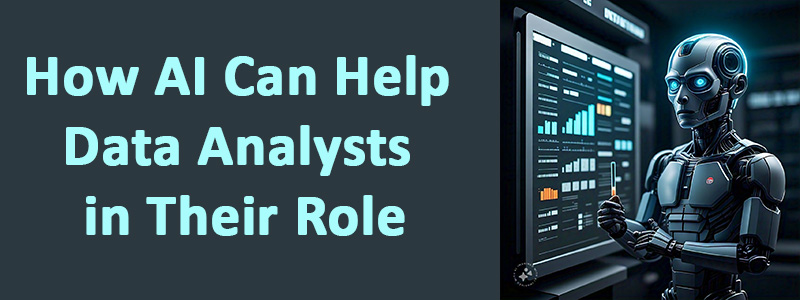How AI Can Help Data Analysts in Their Role
In recent years, Artificial Intelligence (AI) has evolved from a futuristic concept to a practical tool that is transforming various industries. For data analysts, AI offers new ways to optimize workflows, draw deeper insights, and enhance productivity. This blog post explores how AI is empowering data analysts to become more efficient and effective in their roles.
1. Automating Data Cleaning and Preparation
One of the most time-consuming tasks in data analysis is cleaning and preparing data. Data analysts often spend hours fixing missing values, formatting datasets, and eliminating duplicates. AI can automate much of this tedious work through:
- AI-Powered Data Wrangling Tools: Tools like Trifacta and Talend use machine learning algorithms to automatically detect errors and suggest corrections.
- Natural Language Processing (NLP): NLP helps identify inconsistencies in text-based data, such as different formats for names or addresses.
With AI handling repetitive tasks, analysts can focus on generating meaningful insights instead of cleaning raw data.
2. Enhancing Data Visualization
Data analysts rely heavily on visualizations to present findings. AI can assist by:
- Automating Chart Selection: Some tools recommend the most appropriate visualizations based on the nature of the data.
- AI-Based Storytelling: Platforms like Power BI and Tableau use AI to provide narrative insights alongside graphs, explaining trends or anomalies.
These enhancements allow analysts to quickly identify patterns and communicate findings effectively to stakeholders.
3. Predictive and Prescriptive Analytics
AI extends data analysts’ capabilities beyond historical analysis, enabling predictive and prescriptive analytics:
- Predictive Models: Algorithms such as Random Forests, Gradient Boosting, and Neural Networks forecast future outcomes based on past data. For instance, AI can predict customer churn, helping businesses take proactive measures.
- Prescriptive Analytics: AI can recommend the best course of action to optimize outcomes, such as suggesting optimal pricing strategies based on market trends.
These techniques give analysts a competitive edge by helping them forecast future trends and make data-driven recommendations.
4. Faster Data Queries with AI-Powered SQL Tools
AI tools like ChatGPT-powered SQL assistants can simplify the query-writing process. Analysts can describe what they need in plain English, and the AI generates optimized SQL queries. This capability benefits analysts by:
- Saving Time on Query Writing: Complex joins and nested queries can be generated in seconds.
- Error Reduction: AI suggests corrections and optimizations, reducing syntax errors.
This frees up time for analysts to focus more on insights rather than code troubleshooting.
5. Improved Data Quality Monitoring
AI enhances data quality by continuously monitoring datasets and detecting anomalies. Machine learning algorithms can identify unusual patterns in real-time, which might indicate errors, fraud, or system issues. For example:
- AI-Driven Alerts: Platforms can trigger notifications if outliers or data inconsistencies are detected.
- Dynamic Data Validation Rules: AI systems can adapt validation rules as data patterns evolve over time.
This helps ensure that data is reliable and insights remain accurate.
6. Natural Language Interfaces for Easy Data Access
Some modern business intelligence tools now feature AI-powered Natural Language Query (NLQ) interfaces, allowing users to ask questions in natural language instead of writing queries. For example, in Power BI or Tableau, an analyst could type, “What were the sales figures for Q3 in New York?” and the tool would generate the corresponding report.
This makes data analysis more accessible and reduces dependency on technical skills for every query.
7. AI-Powered Forecasting in Financial Markets
For analysts working in financial markets, including Forex traders like myself, AI can enhance forecasting accuracy. Machine learning algorithms analyze historical market data and provide trade signals based on predictive models. Some AI systems also adapt to changing market conditions, giving traders a real-time advantage.
This combination of AI-driven analysis and human expertise improves decision-making in volatile markets.
8. Augmented Analytics for Faster Insights
Augmented analytics, powered by AI, allows analysts to automatically discover insights without manually exploring data. AI systems can run numerous scenarios, detect correlations, and uncover hidden patterns, which would otherwise be missed. These insights are then presented as recommendations to the analyst, who can validate and refine them for final reporting.
9. AI-Assisted Reporting and Documentation
AI can also assist in generating reports by automating repetitive documentation tasks. Tools such as ChatGPT can help analysts draft summaries of findings, write detailed analysis reports, or even prepare presentations. This ensures consistent, high-quality reporting while reducing the time spent on paperwork.
Conclusion
AI is revolutionizing the role of data analysts by automating repetitive tasks, enhancing visualization, enabling predictive insights, and improving data quality. With the integration of AI tools, data analysts can focus more on interpreting data and less on manual processes. By embracing AI, analysts are not only increasing their productivity but also unlocking deeper insights that add significant value to businesses.
As AI continues to evolve, the synergy between human intuition and machine learning will become even more critical. Data analysts who leverage AI will be well-equipped to navigate the data-driven world of tomorrow.

![]()







